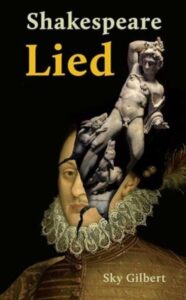Shakespeare Lied
 Shakespeare Lied is Sky Gilbert’s second rumination on Shakespeare to be published by Guernica Editions (following the first Shakespeare Beyond Science, When Poetry was the World published in 2020). It will be available October 1 on Amazon, and Sky will be selling his new book during the conference in Denver. Shakespeare Lied places ‘the bard’ at the centre of present day debates over ‘political correctness’ suggesting Shakespeare’s work offers an alternative to present day artistic practice, which seems to demand all artists take obvious political and moral stands on contemporary issues. Instead James Baldwin said Shakespeare’s goal was “to defeat all labels and complicate all battles by insisting on the human riddle.”
Shakespeare Lied is Sky Gilbert’s second rumination on Shakespeare to be published by Guernica Editions (following the first Shakespeare Beyond Science, When Poetry was the World published in 2020). It will be available October 1 on Amazon, and Sky will be selling his new book during the conference in Denver. Shakespeare Lied places ‘the bard’ at the centre of present day debates over ‘political correctness’ suggesting Shakespeare’s work offers an alternative to present day artistic practice, which seems to demand all artists take obvious political and moral stands on contemporary issues. Instead James Baldwin said Shakespeare’s goal was “to defeat all labels and complicate all battles by insisting on the human riddle.”
Gilbert asserts Shakespeare is not just another dead irrelevant white guy, but that he — in the tradition of the Greek rhetorician Gorgias, and the scandalous, pornographic poet Ovid — was a magnificent, and quite intentional, liar. This means that Shakespeare believed, like Picasso, that art does not so much offer answers, as raise significant questions that help us to be more thoughtful, and ultimately to understand the world more deeply. Shakespeare believed the purpose of art was not to teach, but instead to help us transcend traditional notions of truth.
Shakespeare Lied is the second publication by Dr. Gilbert’s in his quest to acknowledge the classical sources for Shakespeare’s work. In Shakespeare Beyond Science Sky brought attention to Hermogenes of Tarsus as one of Shakespeare’s primary sources, whereas Shakespeare Lied focuses attention on the first and most celebrated Greek sophist, Gorgias. But in any case, Gilbert’s work affirms that Shakespeare — like Edward de Vere — was a man of great learning, who would have had access to a multitude of classical and contemporary sources in the original languages. Shakespeare Lied does not attempt to prove that Shakespeare was de Vere by examining the similarities between de Vere’s life and the work, bur rather confirms that only a nobleman with the breadth of education of someone like Edward de Vere could have been Shakespeare.
Membership dues cover only a fraction of our budget, including all our research, preservation and programming. Please support the SOF by making a gift today!
Blue Boar Tavern: Wassail Q&A
Tuesday Dec. 17, 8pm E / 5pm P
Sign up below for event invites!
